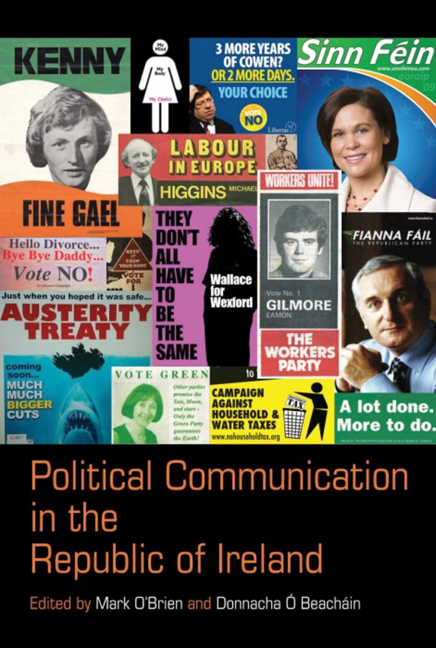Book contents
- Frontmatter
- Contents
- List of Illustrations
- Glossary
- Notes on Contributors
- Acknowledgements
- Introduction
- Part One Political Communication and Politicians
- Part Two Political Communication and Journalism
- Part Three Political Communication and the Public
- 9 A private affair? Lobbying and transparency in modern Ireland
- 10 Equal time for Judas Iscariot? Broadcast treatment of political contests in the Republic of Ireland
- 11 ‘There now follows …’: The role of the party political broadcast and the 2007 ‘peace broadcast’
- 12 Social media and political communication
- 13 Mediating elections in Ireland: evidence from the 2011 general election
- Conclusion
- Index
10 - Equal time for Judas Iscariot? Broadcast treatment of political contests in the Republic of Ireland
from Part Three - Political Communication and the Public
- Frontmatter
- Contents
- List of Illustrations
- Glossary
- Notes on Contributors
- Acknowledgements
- Introduction
- Part One Political Communication and Politicians
- Part Two Political Communication and Journalism
- Part Three Political Communication and the Public
- 9 A private affair? Lobbying and transparency in modern Ireland
- 10 Equal time for Judas Iscariot? Broadcast treatment of political contests in the Republic of Ireland
- 11 ‘There now follows …’: The role of the party political broadcast and the 2007 ‘peace broadcast’
- 12 Social media and political communication
- 13 Mediating elections in Ireland: evidence from the 2011 general election
- Conclusion
- Index
Summary
Elections and referenda are hotly contested, and broadcasters sometimes find themselves accused of bias. The Oireachtas has passed laws that are intended to ensure that the radio and television coverage of campaigns is fair and balanced and is in accordance with constitutional rights. Those who feel aggrieved may complain in the first instance to the relevant broadcaster, and subsequently to the Broadcasting Authority of Ireland. The Oireachtas acts on the basis that broadcasting licences are granted by the state. No similar requirements apply to print or online media.
It has been customary for broadcasters to distribute airtime on any relevant programmes to political parties roughly in proportion to their performance at the preceding general election, in order to achieve fairness and balance without having to give every party the same amount of time on air. During elections it has also long been usual for some Irish broadcasters to devote airtime to short ‘party political broadcasts’. These are not defined in law and the editorial content of each broadcast is controlled entirely by the party to which it is devoted.
During referenda campaigns, airtime may likewise be devoted to broadcasts controlled by contesting parties and other interest groups. Critics object that the legislative requirement for balance in broadcasting distorts the political landscape during some referenda campaigns if the great majority of elected representatives support change but a small minority of public representatives and others receive a disproportionate amount of airtime to oppose it. When broadcasters themselves believe that a referendum proposal that is favoured by a large majority of politicians is eminently reasonable then they may resent facilitating contrary arguments, and some have been known to compare their dilemma mockingly to that of an editor who is forced to give equal airtime to comparing the respective merits of Jesus and Judas (the latter being the apostle who betrayed Jesus to the Romans for 30 pieces of silver). However, broadcasters are not in fact forced by law to give equal airtime to each side of the referendum argument provided that they can achieve fairness, objectivity, and impartiality in some other way.
This chapter examines the statutory requirements for fairness, objectivity, and impartiality in the broadcast treatment of political contests, including referenda, in the Republic of Ireland. It considers the ways in which legislative provisions have been interpreted by those whose duty it is to prepare related guidelines for broadcasters.
- Type
- Chapter
- Information
- Political Communication in the Republic of Ireland , pp. 167 - 184Publisher: Liverpool University PressPrint publication year: 2014

